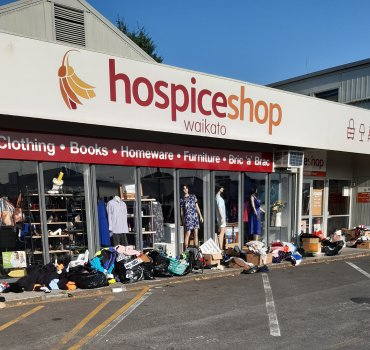

Hospice Waikato Regional Retail Manager Teresa Bidlake says shop volunteers shouldn’t have to deal with rubbish left outside overnight. Pictured are some of the Cambridge shop volunteers, from left, Susan Mayes, Carly Rolley, Ann Hugill and store manager Justine Webb-Elliott.
Clearing out rubbish and unsellable items from shop fronts is becoming an increasing problem for op shops.
Hospice Waikato Regional Retail Manager Teresa Bidlake estimated about 60 to 70 percent of items donated outside of hours are unsellable, and sometimes they are literally bags of household rubbish.
“And then we have to dump it,” Bidlake explained. “Every Monday morning we have to have a truck from Hamilton come and collect it.”
Cambridge has been the worst of all eight Waikato Hospice shops as of late, with frequency increasing over the summer break.
“We’ve got lovely volunteers, but I don’t expect volunteers to then have to deal with people’s rubbish.”
Whilst footing the landfill bill, the organisation does its best to avoid it. “We do try and recycle as much of it as we possibly can,” said Bidlake.
Refuse costs weren’t the only problem with anonymous drop-offs.
“A lot of the (sellable) donated goods that come out-of-hours don’t get to us because it gets pillaged and pilfered, which is a shame because I’m sure the people donating are wanting to help us care for the people dying in our community. That’s what Hospice is about, and unfortunately people are helping themselves.”

Sorting through dumped bags of rubbish and other items has become a regular chore on Monday mornings for Cambridge Hospice shop volunteers.
The Cambridge Hospice Shop now has CCTV cameras operating outside the store.
The organisation provides a region-wide free trucking service to pick up donated items, which operates Monday to Saturday, leaving no room for excuses.
“If people can’t come to us or don’t have time, instead donating out of hours or on the weekend, we’re more than happy to go and pick up.
“We’re trying as best we can to stop those donations going into other people’s hands.”
She added that the best way to determine whether a pre-owned item is sellable in an op shop is to remember, “If you won’t eat off it, wear it yourself, sleep on it, use it or give it to a friend, we can’t really sell it either.
“We would really like to thank the people that are donating. If they could please just donate during shop hours, it would be so helpful to us.”








